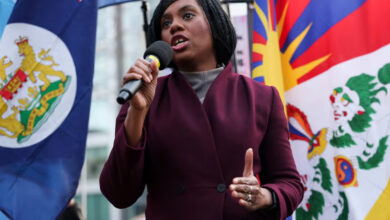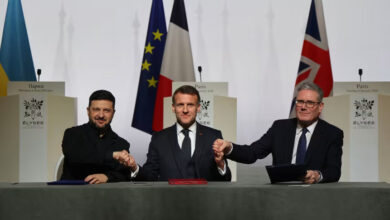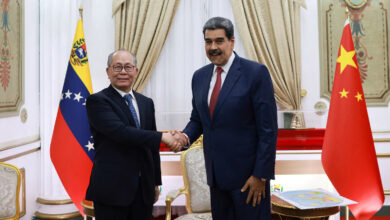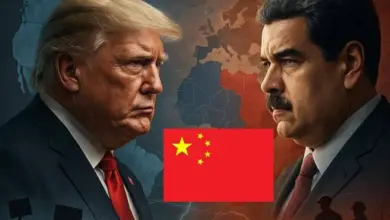
President Donald Trump on Thursday said he would withdraw the United States from the landmark 2015 global agreement to fight climate change, drawing anger and condemnation from world leaders and heads of industry.
Trump, tapping into the “America First” message he used when he was elected president last year, said the Paris accord would undermine the U.S. economy, cost U.S. jobs, weaken American national sovereignty and put the country at a permanent disadvantage to the other countries of the world.
“We’re getting out,” Trump said at a ceremony in the White House Rose Garden under sunny skies on a warm June day, fulfilling a major election campaign pledge.
“We don’t want other leaders and other countries laughing at us any more. And they won’t be,” Trump said.
“The same nations asking us to stay in the agreement are the countries that have collectively cost America trillions of dollars through tough trade practices and in many cases lax contributions to our critical military alliance,” Trump added.
Republican U.S. congressional leaders backed Trump. Senate Majority Leader Mitch McConnell applauded Trump “for dealing yet another significant blow to the Obama administration’s assault on domestic energy production and jobs.”
Supporters of the accord, including some leading U.S. business figures, called Trump’s move a blow to international efforts to tackle dangers for the planet posed by global warming.
Former Democratic President Barack Obama expressed regret over the pullout from a deal he was instrumental in brokering.
“But even in the absence of American leadership; even as this administration joins a small handful of nations that reject the future; I’m confident that our states, cities, and businesses will step up and do even more to lead the way, and help protect for future generations the one planet we’ve got,” Obama added.
Trump, who has called climate change a hoax, said his administration would begin negotiations either to re-enter the Paris accord or to have a new agreement “on terms that are fair to the United States, its businesses, its workers, its people, its taxpayers.” He complained in particular about China’s terms under the agreement.
International leaders reacted with disappointment, even anger.
“The decision made by U.S. President Trump amounts to turning their backs on the wisdom of humanity. I’m very disappointed… I am angry,” Japanese Environment Minister Koichi Yamamoto told a news conference on Friday in an unusually frank tone.
German Chancellor Angela Merkel, French President Emmanuel Macron and Italian Prime Minister Paolo Gentiloni said in a rare joint statement the agreement could not be renegotiated and urged their allies to hasten efforts to combat climate change and adapt.
“While the U.S. decision is disheartening, we remain inspired by the growing momentum around the world to combat climate change and transition to clean growth economies,” said Canadian Prime Minister Justin Trudeau.
A summit between Chinese Premier Li Keqiang and top European Union officials in Brussels on Friday will end with a joint statement – the first ever issued by China and the EU – committing both sides to full implementation of the Paris accord.
Speaking in Berlin a day earlier, Premier Li said China, the world’s biggest emitter of greenhouse gases, would stick to its commitment to fight climate change.
Russia also voiced abiding support for the Paris accord, regardless of the U.S. withdrawal.
“We made the decision to join, and I don’t think we will (change) it,” Deputy Prime Minister Arkady Dvorkovich was quoted as saying by RIA news agency.
In India, one of the world’s fastest growing major economies and a growing contributor to pollution, a top advisor to Prime Minister Narendra Modi vouched for intentions to switch to renewable power generation independent of the Paris accord.
“The prime minister is very keen on this,” Arvind Panagariya said.
Isolated
With Trump’s action, the United States will walk away from nearly every other nation in the world on one of the pressing global issues of the 21st century. Syria and Nicaragua are the only other non-participants in the accord, signed by 195 nations in Paris in 2015.
Fiji’s Prime Minister Frank Bainimarama, who is the incoming head of the U.N. Climate Change Conferences, which formalized the 2015 pact, said Trump’s decision was “deeply disappointing”.
Fiji, like many other small island nations, is seen as particularly vulnerable to global warming and a possible rise in ocean levels as a result of melting polar ice.
U.S. business leaders voiced exasperation with the Trump administration.
“Today’s decision is a setback for the environment and for the U.S.’s leadership position in the world,” Goldman Sachs Group Inc Chief Executive Lloyd Blankfein wrote on Twitter.
Tesla Inc CEO Elon Musk and Walt Disney CEO Robert Iger said they would leave White House advisory councils after Trump’s move.
Under the Paris accord, which took years to reach, rich and poor countries committed to reducing emissions of greenhouse gases generated by burning fossil fuels that are blamed by scientists for warming the planet.
“I was elected to represent the citizens of Pittsburgh, not Paris,” Trump said.
Pittsburgh’s mayor, Democrat Bill Peduto, shot back on Twitter that his city, long the heart of the U.S. steel industry, actually embraced the Paris accord.
The spokesman for U.N. Secretary-General Antonio Guterres called the action a “major disappointment.” The U.N. body that handles climate negotiations said the accord could not be renegotiated based on the request of a single nation.
Australian Prime Minister Malcolm Turnbull, speaking in Singapore on Friday, also called the U.S. decision “disappointing… but not at all surprising,” adding that Australia remained “committed to our Paris commitments.”
South Korea’s foreign ministry said in a statement “it is regrettable that the U.S. withdrawal from the Paris climate accord will undermine international responsibility and efforts to respond to climate change.”
‘DEVASTATING HARM’
Trump said the United States would stop payments to the U.N. Green Climate Fund, in which rich countries committed billions of dollars to help developing nations deal with floods, droughts and other impacts from climate change.
The White House said it would stick to U.N. rules for withdrawing from the pact. Those rules require a nation to wait three years from the date the pact gained legal force, Nov. 4, 2016, before formally seeking to leave. That country must then wait another year.
Apple CEO Tim Cook expressed disappointment and said in an email to employees that he had spoken with Trump on Tuesday to try to persuade him to stay in the Paris accord. “It wasn’t enough,” he said.
Other business leaders warned that the U.S. economy would give away technological leadership.
General Electric CEO Jeff Immelt said he was disappointed, adding: “Climate change is real. Industry must now lead and not depend on government.”
Democrats also blasted Trump. Senate Democratic leader Chuck Schumer called the decision “one of the worst policy moves made in the 21st century because of the huge damage to our economy, our environment and our geopolitical standing.”
The United States had committed to reduce emissions by 26 to 28 percent from 2005 levels by 2025. The United States accounts for more than 15 percent of total worldwide greenhouse gas emissions, second only to China.
Leading climate scientists say greenhouse gas emissions trap heat in the atmosphere and have caused a warming planet, sea level rise, droughts and more frequent violent storms.
A “Global Trends” report prepared by the U.S. Director of National Intelligence’s office, released on Jan. 9, warned that climate change posed security risks because of extreme weather, stress on water and food, and global tensions over how to manage the changes.
Last year was the warmest since records began in the 19th Century, as global average temperatures continued a rise dating back decades that scientists attribute to greenhouse gases.
Frank Rijsberman, Director-General of Seoul based Global Green Growth Institute expected international funding for investment needed to fight climate change would suffer, noting a $1 billion reduction in U.S. funding the Green Climate Fund in South Korea.
Economists said the U.S. withdrawal would potentially cost U.S. jobs. China and the EU both already employ more workers in the renewable energy sector than the United States, according to the data from the International Renewable Energy Agency (Irena).
“Winding back the climate agenda means that the U.S. will be left behind in the clean energy transition as other global players, such as in Europe and China, demonstrate greater commitment to deploying low carbon and job-creating solutions to climate change,” said Peter Kiernan, of the Economist Intelligence Unit.
Additional reporting by Timothy Gardner, Roberta Rampton, and Eric Walsh in WASHINGTON; Robin Emmott and Robert-Jan Bartunek in BRUSSELS; Michelle Nichols at the UNITED NATIONS; Kiyoshi Takenaka in TOKYO; Jane Chung in SEOUL; Jane Wardell in SYDNEY; Sudarshan Varadhan in NEW DELHI; Writing by Will Dunham and Henning Gloystein; Editing by Peter Cooney and Simon Cameron-Moore; Reuters




